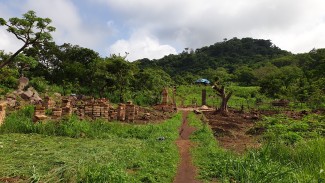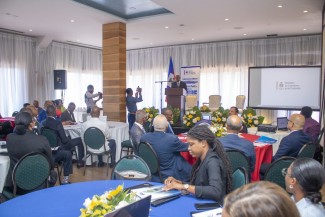The least developed country (LDC) category was created by the United Nations in recognition that some countries are at a distinct disadvantage, being highly vulnerable to economic and environmental shocks.
The shock of COVID-19 is definitely exposing those vulnerabilities.
A new World Trade Organization (WTO) report, Strengthening Africa’s capacity to trade, addresses the disruptions to trade due to the pandemic and outlines the ways the international body is working to encourage trade flows on the continent. As LDCs, countries get additional international support with development assistance and with trade, and 33 of the 46 LDCs today are in Africa.
What does the report say of African LDCs and global trade? What support are countries being given to best weather this COVID-19 storm?
Declines and setbacks
A March 2021 WTO forecast has trade likely to remain below pre-pandemic levels for some time, but predicts an increase of world merchandise trade to 8.0% in 2021, after falling 5.3% in 2020.
The WTO’s Africa report states, “Trade has allowed many developing countries to benefit from the opportunities created by emerging new markets by enabling them to integrate into the world market through global value chains. Moreover, the unbiased, predictable and non-discriminatory regime maintained by the multilateral trading system places all economies – developing and developed, small and large – on an equal footing.”
But COVID-19 is hitting the most vulnerable the hardest, with the United Nations Conference on Trade and Development (UNCTAD) foreseeing LDCs to “experience their worst economic performance in 30 years.”
According to the International Monetary Fund’s April 2021 World Economic Outlook, growth in
sub-Saharan Africa was negative in 2020 at -1.9%, and estimated at 3.4% in 2021. The global numbers are -3.3% in 2020 and 6.0% in 2021. For LDCs as a whole, as noted in the UNCTAD Least Developed Country Report 2020, gross domestic product (GDP) per capita was projected to contract by 2.6% in 2020 from what were already low levels.
The WTO report notes that economic vulnerabilities in Africa are in part tied to the prevalence of informal employment that was disrupted by lockdowns, dependance on tourism revenue and supply chain disruptions. It states, “Other contributing factors include lower trade and investment from China – a major partner for the poorest countries on the continent – as well as a demand slump from other trading partners, including Europe and the United States, and depressed intra-continental trade.”
With LDCs in Africa having worked over the years and decades to diversify economies and ensure smoother trade flows, resulting in more jobs and improved livelihoods, a lot of progress with development, with poverty alleviation and with education is now being erased.
Trade support and assistance
The report states, “Due to the low levels of domestic resources available, external funding and financial flows will play an important part in African countries’ recovery from COVID-19.” Funding that has emerged includes the World Bank’s US$14 billion COVID-19 crisis response facility, the International Finance Corporation’s $6 billion trade and working capital finance initiative, the Asian Development Bank’s US$20 billion comprehensive support package to assist its developing member countries fight COVID-19, and the African Development Bank’s $10 billion COVID-19 Response Facility.
LDCs are supported by a number of different bodies at the WTO, including the Development Division. And there is the Aid for Trade initiative, which helps developing countries and especially LDCs build infrastructure and supply-side capacity, with the Standards and Trade Development Facility (STDF) and the Enhanced Integrated Framework (EIF) falling under that umbrella. In 2018, Africa received $16.9 billion in Aid for Trade, and a little less than half went to African LDCs, or approximately $8 billion.
The world’s global trade body also works with its African members, known as the African Group, to implement WTO agreements. This key, informal constituency draws its guidance from African Ministers of Trade, and strives to foster export diversification, needed structural transformation and industrialization on the continent, as noted in the report.
Agreements and special provisions
A series of WTO agreements and decisions have contributed to economic diversification among developing country members, including developing countries in Africa, the report states. These include the Trade Facilitation Agreement (TFA), the Agreement on Trade-Related Investment Measures (TRIMs) and the General Agreement on Tariffs and Trade (GATT). The TFA allows LDCs needed flexibility to manage commitments and implementation schedules.
All WTO agreements contain provisions of special and differential treatment for developing countries that include longer periods to implement agreements and commitments. LDCs receive particular treatment that includes exemption from many provisions.
The Hong Kong Ministerial Decision and the Bali Ministerial Decision provide for duty-free and quota-free market access to LDCs, and this has had a particular impact on African LDCs. And LDCs get support from STDF so that imports and exports meet sanitary and phytosanitary requirements for trade based on international standards.
This range of efforts, agreements, aid and provisions aims at boosting the ability and options countries in Africa have to trade globally and benefit locally.
Intellectual property and COVID-19
The WTO Agreement on Trade-Related Aspects of Intellectual Property Rights (TRIPS Agreement) serves as the basis for the world’s intellectual property regulation. It is not immediately binding for LDCs, with the transition period currently set to expire on 1 July 2021.
The report notes that transfers of technology to African LDCs facilitated by the TRIPS Agreement have played a significant role in work to enhance cotton production and processing in Benin, Burkina Faso, Chad and Mali.
A proposal submitted by South Africa and India in October 2020 called for a waiver for all WTO members of certain provisions of the TRIPS Agreement related to the prevention and treatment of COVID-19 that includes the intellectual property rights to COVID vaccines. The waiver has since been co-sponsored by the African Group and the LDC Group and others – or a total of 60 WTO members.
The TRIPS Council has in several meetings discussed the waiver, which could potentially boost production of and access to COVID-19 vaccines around the world, and have a big impact on people in African LDCs. The text of the draft proposal states that it would continue “until widespread vaccination is in place globally, and the majority of the world’s population has developed immunity”.
On Wednesday 5 May, the WTO General Council discussed access to vaccines and the waiver, with over 40 delegations taking the floor to offer their views. That same day, the United States reversed its position and announced its support for the waiver. The discussion at the WTO will continue in May and at the upcoming TRIPS Council meeting set for early June.
If you would like to reuse any material published here, please let us know by sending an email to EIF Communications: eifcommunications@wto.org.



